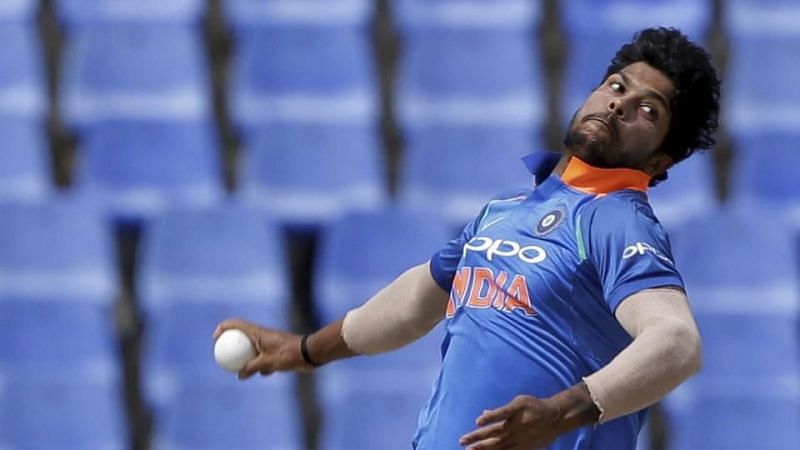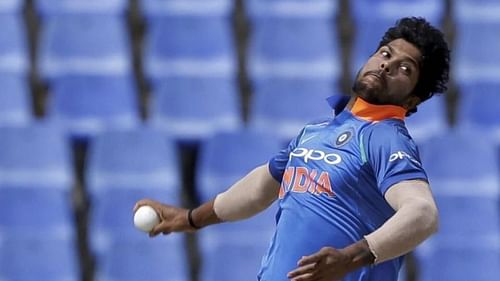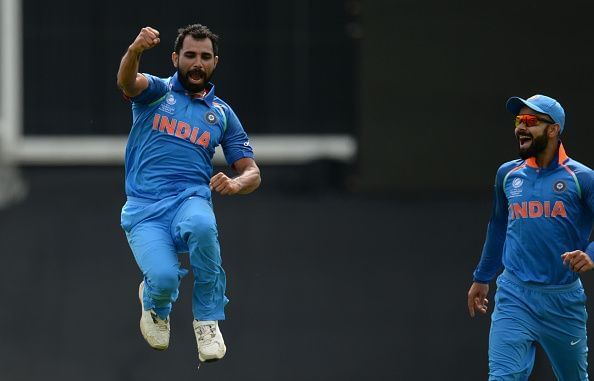
Umesh Yadav: Shami and I have to take more responsibility in death overs

In a significant shift from the first three ODIs, India fielded a new-look eleven in Bengaluru for the fourth ODI. Kuldeep Yadav, Jasprit Bumrah, and Bhuvneshwar Kumar, all of whom had been amongst the wickets in the series were rested and were replaced by Axar Patel and the experienced duo of Umesh Yadav and Mohammad Shami.
The changes were expected, given that the match was a dead rubber, but things didn't exactly go according to the plan for captain Virat Kohli, as Australia openers Aaron Finch and David Warner put up a 231-run opening stand, which laid the platform for the middle order to build a total in excess of 300.
One would have questioned whether the inclusion of Bumrah and Bhuvneshwar -- two of the best death-overs exponents going around -- could have changed things towards the end. Yadav, though, believes that a bit more responsibility should have been taken by Shami and himself towards the death.
"The team's morale is good even after the loss (in Bengaluru). I think we gave 15-20 runs extra. Shami and I played after a long time, but since we are senior players, we have to deliver on whatever the team needs from us. Shami and I have to take more responsibility in the death overs," Umesh said during a pre-match press conference on the eve of the final ODI in Nagpur.
Too many matches takes toll on fitness
The 29-year-old didn't feature in any of the first three ODIs and had played his last ODI in the West Indies in July. He cited workload management -- a term more widely in discussion these days than even before -- as the reason why bowlers, and batsmen for that matter, are being rotated in and out.
"You can play matches continuously, but that takes a toll on your fitness level. In time, the small niggles that you pick up during games pile up and result in injuries that force long three-month layoffs. That way the team management is doing an excellent job in terms of managing our workload. They assess how much we've bowled during the games and in between and plan our recovery periods accordingly," Umesh said.
Does it mean that he's ready to choose between Tests and limited-overs games?
"If there are lots of Test matches, then you have to choose. But you can’t say that you will play Tests only because there will be a time when there are not playing enough games in a season. What will you do in free time? The body needs match practice," he said, expressing his availability for all formats, subject to fitness.
A lot has been said and written about the bench strength of the current India set-up. Such has been the consistency of some of the players that experienced Test cricketers like Ravichandran Ashwin and Ravindra Jadeja have been forced to sit out of the side. Amongst fast bowlers, Shami and Umesh have been travelling with the team on occasions without getting enough match practice.

"It is said that you must keep practicing in the nets, but it doesn't help you as much as match practice does. We do practice in the nets but rarely do we have an idea about what's happening. We don't know which way the ball is moving. There's a difference between bowling at your own teammates and bowling at the opposition," the Vidarbha quipped about the necessity of match practice in addition to bowling in the nets.
Must know how much to bowl in the series
Umesh also made his opinion clear about which format of the game he prefers playing the most. His comments brought some clarity to the kind of fast-bowling attack that India field in Tests and ODIs.
"If you have four Tests to play followed by a limited-overs series, I would prefer playing the Test series first and then see at the end of it how my body is functioning. If I feel that my body is ready for more cricket, I would tell the management that I am ready to play. It's not that I'd play only Tests and no ODIs. This is cricket. You need to play all formats otherwise there's no point being a fast bowler or a cricketer," he said.
Umesh has been one of the fittest players in the side over past two years and that has been largely because -- and by his own admission -- he knows how to cater to his body's needs.
"As a fast bowler, if you're coming into a limited-overs series after having played Tests, you must know how much you should be bowling between the series. You should know how quickly can you recover from any injury that you might have sustained and what are the chances of you getting injured. You have to look after yourself and know what your body needs," he talked about managing the rigours of international cricket.
"If I am bowling in the nets, I know exactly how many overs I am required to bowl and how much time do I need to spend in the nets. It all depends on your body. If your body is functional and smooth, it is okay. But if you have been playing a long season, I think more than bowling practice you need recovery time."